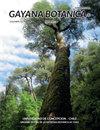CHROMOSOME NUMBERS OF CHILEAN PTERIDOPHYTES: FIRST CONTRIBUTION
IF 0.5
4区 生物学
Q4 PLANT SCIENCES
引用次数: 12
Abstract
Mitotic chromosome counts in Chilean pteridophytes confirm the diploidy described for Equisetum L. (2n = 216) and Blechnum L. (2n = 66), as well as the tetraploidy of Asplenium L. (2n = 144). Megalastrum spectabile (Kaulf.) A.R.Sm. et R.C.Moran is diploid (2n = 82), while in metaphases of Polystichum subintegerrimum (Hook. et Arn.) R.A.Rodr. chromosome numbers from ca. 311 to 328 were counted. Tetraploidy was also described in Adiantum chilense Kaulf. (2n = 116)智利蕨类植物的染色体数目:首次贡献
本文章由计算机程序翻译,如有差异,请以英文原文为准。
求助全文
约1分钟内获得全文
求助全文
来源期刊

GAYANA BOTANICA
Agricultural and Biological Sciences-Plant Science
CiteScore
0.70
自引率
0.00%
发文量
8
审稿时长
6-12 weeks
期刊介绍:
The journal welcomes works carried out by scientists of all nationalities, and may be written in either English or Spanish. The journal receives works in systematic, taxonomy, floristic, ecology, physiology, morphology, development, conservation, cytology and phytochemical botany.
 求助内容:
求助内容: 应助结果提醒方式:
应助结果提醒方式:


